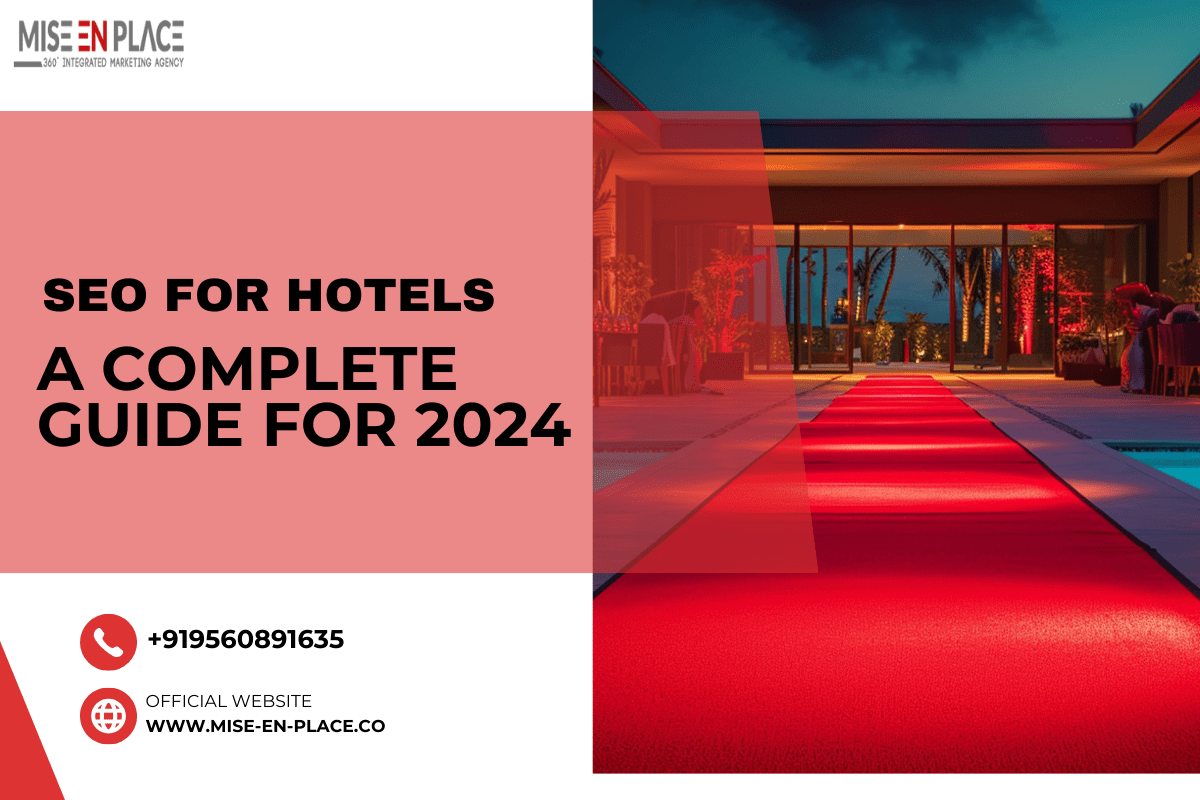Introduction:
In the digital age, where online visibility can make or break a business, Search Engine Optimization (SEO) is a pivotal tool for hotels to thrive in the competitive hospitality industry. As we usher in 2024, the significance of a robust SEO strategy for hotels cannot be overstated. This comprehensive guide will unravel the intricacies of SEO for hotels, exploring why it’s indispensable for the industry’s success and providing actionable insights to navigate the evolving landscape.
What is SEO for Hotels?
Before delving into the ‘why,’ it’s essential to understand what SEO for hotels entails. SEO is the practice of optimizing a website to enhance its visibility on search engines like Google, Bing, or Yahoo. For hotels, this involves implementing strategies that ensure their website ranks higher in relevant search results, ultimately driving organic traffic and bookings.
Why SEO is Crucial for the Hotel Business:
Increased Visibility:
At the core of SEO lies the goal of improving a website’s visibility on search engines. In a world where potential guests turn to the internet to research and book accommodations, being prominently featured in search results is paramount. A higher ranking increases the likelihood of attracting users seeking hotel services.
Builds Credibility and Trust:
Website visitors often place trust in sites that feature on the initial page of search results. Elevating your hotel’s online visibility not only boosts credibility but also fosters trust among prospective guests. Trust holds particular significance in the hospitality sector, where patrons seek reassurance before finalizing reservations.
Targeted Traffic:
SEO allows hotels to target specific demographics and markets. By optimizing for relevant keywords and implementing local SEO strategies, hotels can connect with their ideal audience – those actively looking for accommodation in their location. This targeted approach ensures that the traffic driven to the website is more likely to convert.
Competitive Edge:
In a saturated market, having a well-optimized website can provide a competitive edge. If your competitors are investing in SEO and you are not, you risk losing potential guests to them. Staying ahead in search rankings ensures that your hotel remains top-of-mind when travelers are making booking decisions.
Adaptation to Changing Consumer Behavior:
The way consumers search for and book hotels has evolved. With the prevalence of mobile devices and voice search, hotels must adapt their online presence to meet these changing behaviors. SEO helps in optimizing for mobile users, ensuring a seamless experience across devices.
Key Components of SEO for Hotels:
Mobile Optimization:
With the rise of mobile searches, having a mobile-friendly website is not just beneficial but imperative. Google prioritizes mobile-responsive sites, and failure to comply can lead to a drop in rankings.
Local SEO:
Harnessing the power of local searches is crucial for hotels. Optimizing Google My Business listings, incorporating location-based keywords, and encouraging positive reviews contribute to improve local SEO.
Keyword Research and Targeting:
Thorough keyword research helps identify the terms potential guests are using to search for accommodations. Incorporate these keywords naturally into your website’s content to enhance its relevance to search engines.
Content Creation:
Quality content not only engages visitors but also attracts search engine attention. Regularly updating your website with informative content, blog posts, and destination guides can contribute to improved rankings.
User Experience (UX):
A seamless user experience is rewarded by search engines. Optimize your website’s navigation, improve page load times, and create clear calls-to-action for booking to enhance overall user satisfaction.
Security with HTTPS:
Security is a growing concern, and Google considers HTTPS as a ranking factor. Ensure your hotel’s website is secured with an SSL certificate to boost both security and rankings.
Social Media Integration:
Social signals contribute to SEO success. Maintaining an active presence on social media platforms enhances brand visibility, drives traffic, and positively impacts search engine rankings.
Performance Monitoring:
Consistently track your website’s performance through tools such as Google Analytics. Examining key performance indicators offers valuable insights into the success of your SEO strategy, enabling well-informed adjustments.
Conclusion:
As we navigate the dynamic landscape of the hospitality industry in 2024, embracing and mastering SEO for hotels is not just an option but a necessity. By understanding the core principles, staying abreast of industry trends, and consistently refining strategies, hotels can ensure they are not just seen but preferred by their target audience in the digital realm. Elevate your hotel’s online presence through SEO, and witness increased visibility, credibility, and bookings in the competitive world of hospitality.
Partnering with a well-established SEO and Digital Marketing Agency such as Mise En Place in Delhi can equip businesses with the necessary expertise and guidance to effectively navigate the intricacies of SEO. By tapping into their wealth of knowledge and experience, businesses can implement customized SEO strategies tailored to their objectives and target audience.
SEO is an ongoing effort that demands continuous processes of optimization, monitoring, and adaptation to stay abreast of evolving search engine algorithms and user preferences. Through the investment in SEO services, businesses can unleash the full potential of their online presence, optimize visibility in search results, and attract a consistent stream of high-quality organic traffic.
As businesses embrace the opportunities of 2024, giving precedence to SEO emerges as a strategic move that can significantly influence their success in the digital realm. Adhering to SEO best practices enables businesses to fortify their brand presence, connect with their target audience, and attain their business goals in the ever-changing digital landscape.
For more information about our services, kindly explore our official website at https://www.mise-en-place.co/.
Why is SEO crucial for hotels in 2024?
In 2024, the hospitality industry is more competitive than ever, with travelers relying heavily on online searches to find accommodations. SEO is crucial for hotels as it enhances visibility, builds credibility, and ensures that your hotel stands out in a saturated market. With the right SEO strategies, hotels can attract targeted traffic, adapt to changing consumer behaviors, and gain a competitive edge in the digital landscape.
How can Hotels Optimize for Local Searches?
Local SEO is essential for hotels to connect with potential guests in their vicinity. To optimize for local searches, hotels should claim and optimize their Google My Business listing, incorporate location-based keywords in their content, and encourage positive reviews from satisfied guests. These strategies contribute to improved local visibility, making it easier for travelers to discover and choose your hotel.
What role does mobile optimization play in SEO for hotels?
Mobile optimization is a critical aspect of SEO for hotels. With the increasing prevalence of mobile searches, search engines prioritize mobile-friendly websites. Hotels should ensure responsive design, fast loading times, and intuitive navigation across various devices. Failing to meet these criteria may result in lower rankings, hindering the hotel’s ability to reach and engage with mobile users actively seeking accommodations.
How can hotels leverage social media for SEO benefits?
Social media integration is a valuable aspect of SEO for hotels. Maintaining an active presence on platforms like Facebook, Instagram, and Twitter not only enhances brand visibility but also drives traffic to the hotel’s website. Social signals contribute to SEO success, and hotels can encourage user-generated content, share updates, and engage with followers to positively impact search engine rankings.
Is content creation important for SEO in the hotel industry?
Absolutely. Quality content is crucial for SEO success in the hotel industry. Regularly updating your website with informative content, blog posts, and destination guides not only engages visitors but also signals to search engines that your site is relevant and valuable. Well-crafted content that addresses the needs and interests of your target audience contributes significantly to improved search engine rankings and overall online visibility.



